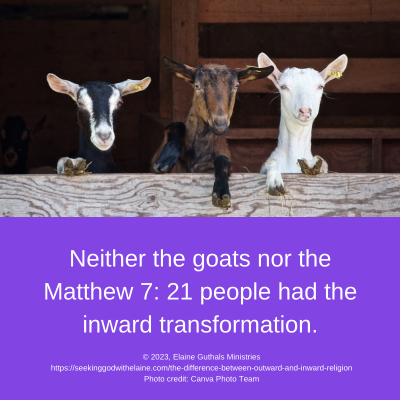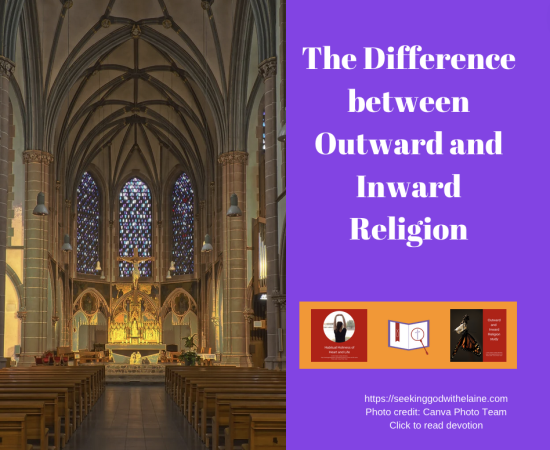We have talked about inward transformation being needed as opposed to an outward walk. This devotional reading looks at applying that to the church as a whole.
Nuggets
- In the Day of the Lord, the net will sweep up everyone — believer and non-believers and everyone in between.
- The goats are those who are cursed.
- The determination of believers and non-believers will not happen until the Day of the Lord.
- Both builders in the parable knew the building should be built but went about it in different ways.

When we were doing our Finding Jesus through Spiritual Worship study, something flitted through my mind. We’ve talked about the sheep and the goats. We’ve also talked about the Matthew 7: 21 people.
The sheep are believers. The goats are nonbelievers. The Matthew 7: 21 people are sheep who really aren’t sheep.
What if the believers who are aren’t really sheep are goats?
There are two ways we can consider salvation. The first way is that it is just a yes and no option. The second way is that there are degrees of yes.
I found a sermon that I hope will help us figure this out. Is it yes or no, or is it a matter of transformation? How does that affect the church?
Let's Put It into Context
To read devotions in the Habitual Holiness of Heart and Life theme, click the button below.
Here is a running list of nuggets for the theme.
Devotions in the Outward and Inward Religion study
Here is a running list of nuggets for the study.
We are using Boston’s sermon as the foundation for this series.
Resource
Different Characters Given in the Church
“Again, the kingdom of heaven is like a net that was thrown into the sea and gathered fish of every kind. When it was full, men drew it ashore and sat down and sorted the good into containers but threw away the bad. So it will be at the end of the age. The angels will come out and separate the evil from the righteous and throw them into the fiery furnace. In that place there will be weeping and gnashing of teeth” (Mt. 13: 47-50 ESV)
In the Day of the Lord, the net will sweep up everyone — believer and non-believers and everyone in between.
The Day of the Lord is when we will be called home to Heaven to stand in judgment. This isn’t a selective judgment. Everyone will go through it.
That is the symbolism of the net. Fishermen threw the net out and got everything in its path.
Arnot stated it this way. He wrote, “Good and bad alike are drawn in company towards the shore, but the good and bad are separated when they reach it.”
Resource
The separation comes later. The fishermen got off the boat and evaluated their catch.
It is interesting that the angels are the ones doing the separating. No, not Jesus.
That leads me to think that yes and no are the only options.
Dods made a good point. The church is made up of a variety of people. If non-believers aren’t in the church, they won’t hear the Plan of Salvation. We know disciples are at differing places along the Navigational Road. Those who are believers have differing skills and abilities.
Resource
The separation must occur at the end of time. If it were to happen now, some who may be saved would be prevented from accepting God’s gift.
We don’t want that to happen.
God does not want us to not accept His salvation.
- “The Lord is not slow to fulfill his promise as some count slowness, but is patient toward you, not wishing that any should perish, but that all should reach repentance” (II Pet. 3: 9 ESV).
- “For I have no pleasure in the death of anyone, declares the Lord God; so turn, and live” (Ezek. 18: 32 ESV).
- “For God so loved the world, that he gave his only Son, that whoever believes in him should not perish but have eternal life” (Jn. 3: 16 ESV).
Keach said that the net is the gospel. Think about it. The gospel is sent out to all to gather those who would accept it.
Resource
I look at this as being an example of how God’s Word is applicable to both the present and the future. We know this happens.
Goats and Sheep
“Then he will say to those on his left, ‘Depart from me, you cursed, into the eternal fire prepared for the devil and his angels. For I was hungry and you gave me no food, I was thirsty and you gave me no drink, I was a stranger and you did not welcome me, naked and you did not clothe me, sick and in prison and you did not visit me.’ Then they also will answer, saying, ‘Lord, when did we see you hungry or thirsty or a stranger or naked or sick or in prison, and did not minister to you?’ Then he will answer them, saying, ‘Truly, I say to you, as you did not do it to one of the least of these, you did not do it to me.’ And these will go away into eternal punishment, but the righteous into eternal life” (Mt. 25: 41-46 ESV)
The goats are those who are cursed.
Jesus taught using examples that His audience would understand. They would know that sheep are obedient. Disciples are called to be obedient to God.
Goats, on the other hand, are known to be unruly. They are also known as unclean.
In the sheep and the goats passage, the goats on the left were called cursed. “Then he will say to those on his left, ‘Depart from me, you cursed, into the eternal fire prepared for the devil and his angels’” (Mt. 25: 41 ESV).
Non-believers are identified in Scriptures by the terms wicked, dead, cursed, and evil. People who are cursed have not ABCDed.
But this all started when I asked if people who are lip-service people are really cursed. So, let’s look at the separation.
The cursed thought they were sheep. “Then they also will answer, saying, ‘Lord, when did we see you hungry or thirsty or a stranger or naked or sick or in prison, and did not minister to you?’” (Mt. 25: 44 ESV emphasis added). The goats thought they were doing enough to earn salvation.
The Matthew 7: 21 people thought they were, too. “Not everyone who says to me, ‘Lord, Lord,’ will enter the kingdom of heaven, but the one who does the will of my Father who is in heaven” (Mt. 7: 21 ESV).
Coad put it an interesting way. He wrote, “It will be a separation in interest and employment.”
Resource
It isn’t just the outward actions that earn us salvation. It is the inward transformation.
Neither the goats nor the Matthew 7: 21 people had the inward transformation.

Tares and Wheat
“He put another parable before them, saying, ‘The kingdom of heaven may be compared to a man who sowed good seed in his field, but while his men were sleeping, his enemy came and sowed weeds among the wheat and went away. So when the plants came up and bore grain, then the weeds appeared also. And the servants of the master of the house came and said to him, “Master, did you not sow good seed in your field? How then does it have weeds?” He said to them, “An enemy has done this.” So the servants said to him, “Then do you want us to go and gather them?” But he said, “No, lest in gathering the weeds you root up the wheat along with them. Let both grow together until the harvest, and at harvest time I will tell the reapers, ‘Gather the weeds first and bind them in bundles to be burned, but gather the wheat into my barn’”’” (Mt. 13: 24-30 ESV)
The determination of believers and non-believers will not happen until the Day of the Lord.
We won’t know who is a sheep or who is a goat until the separation happens at the Day of the Lord. Until then, we will have people thinking they are spending eternity with God — and they aren’t.
Gray explained. He wrote the tares are, “Those who outwardly profess religion, but inwardly reject it. It is likeness to wheat which makes tares specially mischievous.”
Resource
Again, we are talking about the condition of the church here. The weeds have infiltrated the church.
The interesting point is the wheat knows it has been infiltrated. It wants out now.
But God says wait.
Part of the reason is because the enemy has done this (Mt. 13: 28). Satan is the enemy.
Satan won’t be defeated until the Day of the Lord.
What was one of Paul’s favorite topics? There were false teachers in the church.
Unfortunately, we put too much emphasis on the teachers part and ignore the false part. Yes, they may have gotten leadership positions in our churches.
But there are too many church members out there who are missing Jesus. They are compromising with Satan and trying to rewrite God’s Word. They aren’t teaching those with whom they come into contact about God.
I don’t read this to say the church did anything to cause the infiltration. Satan snuck in and planted his seed.
That tells me that we must be vigilant. God is always telling us to watch. We have to realize that Satan is going to try infiltrate us.
What better way to try to bring down the church than to get sin as a part of it?
Verse 25 talks about how Satan comes in when everyone is sleeping — i.e., not watching. He doesn’t need the instant gratification we think we deserve when we do something. He is okay with the long haul.
Well, maybe the church did do something to help cause it. They didn’t watch, so it only took Satan one try to get the weeds planted.
Again, the point is that people that looked to be disciples really weren’t.
Wise and Foolish
“Everyone then who hears these words of mine and does them will be like a wise man who built his house on the rock. And the rain fell, and the floods came, and the winds blew and beat on that house, but it did not fall, because it had been founded on the rock” (Mt. 7: 24-25 ESV)
Both builders knew the building should be built but went about it in different ways.
Oh, man. I have never looked at this parable through this lease.
Burns invited us to look at both builders being in the church. He wrote, “They both heard Christ’s sayings; both saw the necessity of building a house, or place of refuge; both actually erected a house; both houses were exposed to storms; both builders rested with security in the edifices they had raised.”
Resource
That make sense. Non-believers wouldn’t be building the building.
One chose not to follow Jesus’ words. They may have looked like it because they built the house.
That is, they looked like it until the rains come. Then, it was shown that they did not have their foundation in Jesus.

Making the Connections
Wow! Why are all these passages that I grew up thinking they were about non-believers really about believers?
One reason is because I thought about believers, not about disciples. There is a difference.
Believers can be those who only believe but are not growing. Disciples are students who are growing.
I think another reason is because of John 3: 18. “Whoever believes in him is not condemned, but whoever does not believe is condemned already, because he has not believed in the name of the only Son of God” (Jn. 3: 18 ESV).
Non-believers are already condemned. If they refuse to believe, nothing is going to change their minds.
Those who have made a profession of faith once — albeit not genuine — will — hopefully — be more open to making a real profession.
This goes along with what God has been telling Pastor Steve. His Church is missing Jesus.
True disciples have to make an inward transformation.
How Do We Apply This?
- Resist and restore those who are doing wrong.
- Watch for the enemies within.
- Carefully examine what we are doing and why we are doing it.
- Know Jesus personally as our Savior and Redeemer.
- Realize the necessity of being godly.
Resource
Father God. Forgive us for not being true disciples. We want our foundation to be built on You. We don’t want Satan to sneak in and sow sin in our lives. We want to be one of Your sheep, led by the Shepherd. Amen.
What do you think?
Leave me a comment below (about this or anything else) or head over to my Facebook group for some interactive discussion.
If you don’t understand something and would like further clarification, please contact me.
If you have not signed up for the email providing the link to the devotions and the newsletter, do so below.
If God has used this devotion to speak with you, consider sharing it on social media.